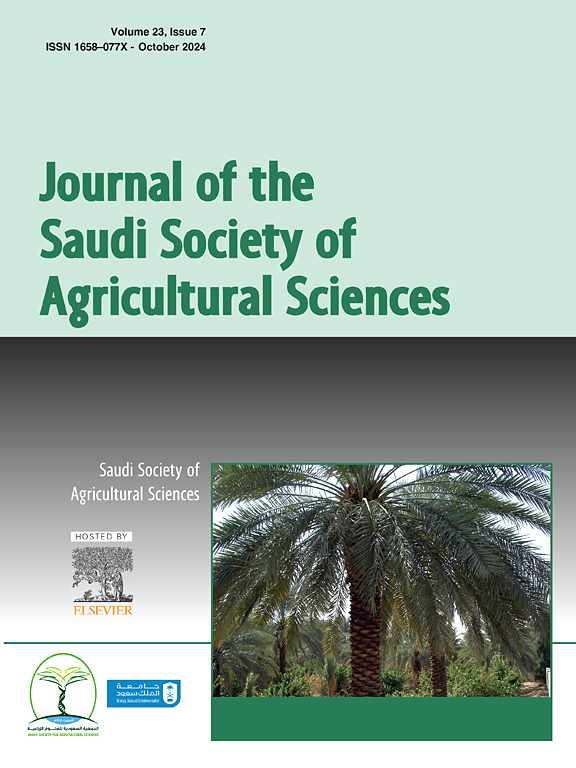The effect of microplastic contaminated compost on the growth of rice seedlings
Q1 Agricultural and Biological Sciences
Journal of the Saudi Society of Agricultural Sciences
Pub Date : 2024-12-01
DOI:10.1016/j.jssas.2024.07.001
引用次数: 0
Abstract
Microplastics (MPs) are pollutants that have contaminated compost, but there are few studies on the interaction between compost contaminated with MPs (MPsC) and rice seedling performance. This study investigated the effect of MPsC on the planting activity in rice. In this Three different treatments were applied: treatment 1 (P1) as a control without the addition of MPs, Treatment 2 (P2) with the addition of a 1 % PET MPs concentration, and Treatment 3 (P3) with the addition of a 2 % PET MPs concentration. Rice seedlings were planted in the planting medium of each treatment and observed for 24 days after planting (dap). Treatment with the addition of PET MPs showed a significant reduction 38 %, 25 %, 25 % at root length, height, and fresh weight respectively. Additionally, in chlorophyll content there was a decrease of 42 %, 45 %, 55 % in Chl a, Chl b, and total Chl. This decrease may be caused by disturbances in nutrition and photosynthesis processes due to exposure to MPs. The addition of PET MPs to compost as a planting medium can inhibit the growth and health of rice seedlings. These findings underscore the critical need for effective management of plastic waste in agricultural compost to mitigate its adverse effects on plant growth and environmental sustainability. Proper disposal and treatment of plastic contaminants are essential to maintain the integrity of compost used in agriculture, thereby ensuring optimal plant health and ecological balance.
受微塑料污染的堆肥对水稻秧苗生长的影响
微塑料是污染堆肥的污染物,但对微塑料污染的堆肥与水稻幼苗性能之间的相互作用研究较少。研究了MPsC对水稻种植活性的影响。在这项研究中,采用了三种不同的处理:处理1 (P1)作为对照,不添加MPs,处理2 (P2)添加1% PET MPs浓度,处理3 (P3)添加2% PET MPs浓度。在每个处理的种植介质中种植水稻幼苗,并在种植后观察24 d (dap)。添加PET MPs处理的根长、根高和根鲜重分别显著降低38%、25%和25%。Chl a、Chl b和总Chl含量分别降低42%、45%和55%。这种减少可能是由于暴露于MPs而引起的营养和光合作用过程的干扰。在堆肥中添加PET MPs作为种植介质会抑制水稻幼苗的生长和健康。这些发现强调了对农业堆肥中的塑料废物进行有效管理的迫切需要,以减轻其对植物生长和环境可持续性的不利影响。适当处置和处理塑料污染物对于保持农业中使用的堆肥的完整性至关重要,从而确保最佳的植物健康和生态平衡。
本文章由计算机程序翻译,如有差异,请以英文原文为准。
求助全文
约1分钟内获得全文
求助全文
来源期刊

Journal of the Saudi Society of Agricultural Sciences
Agricultural and Biological Sciences-Agricultural and Biological Sciences (all)
CiteScore
8.70
自引率
0.00%
发文量
69
审稿时长
17 days
期刊介绍:
Journal of the Saudi Society of Agricultural Sciences is an English language, peer-review scholarly publication which publishes research articles and critical reviews from every area of Agricultural sciences and plant science. Scope of the journal includes, Agricultural Engineering, Plant production, Plant protection, Animal science, Agricultural extension, Agricultural economics, Food science and technology, Soil and water sciences, Irrigation science and technology and environmental science (soil formation, biological classification, mapping and management of soil). Journal of the Saudi Society of Agricultural Sciences publishes 4 issues per year and is the official publication of the King Saud University and Saudi Society of Agricultural Sciences and is published by King Saud University in collaboration with Elsevier and is edited by an international group of eminent researchers.
 求助内容:
求助内容: 应助结果提醒方式:
应助结果提醒方式:


